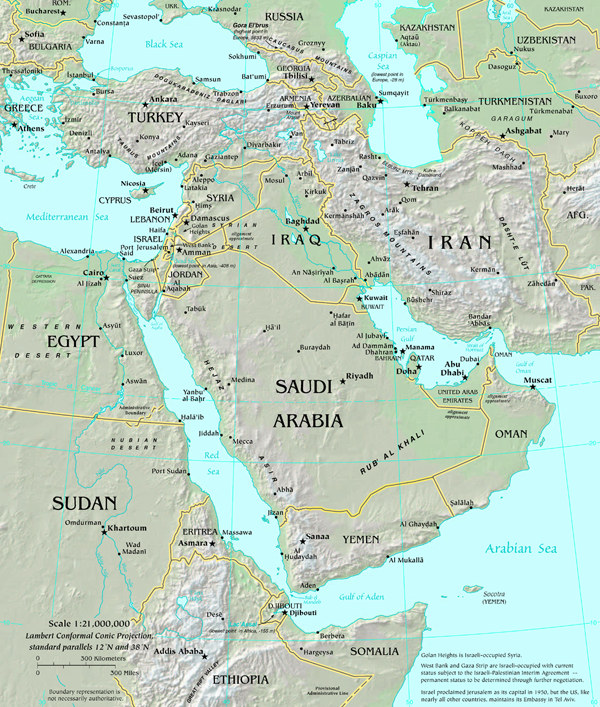As the one-year anniversary of the Russian-Georgian War approaches hostilities are rising across the region

. Naturally the main areas of concerns are the members of the anti-Russian post-Soviet group
GUAM which consists of Georgia, Ukraine, Azerbaijan, and Moldova. The most obvious source of tensions is Georgia where both sides are claiming ongoing strikes into the other's territory. Russia has responded to this escalation by
putting its forces on high alert. At the same time
Georgia is claiming that Russian forces are attempting to move South Ossetia's border to grab Georgian territory.
While 2008's war was about securing independence of Abkhazia and South Ossetia, which will both likely be absorbed into Russia, a new war would have different motivations. Of primary interest would be removing Mikhail Saakashvili from power with one possible motivation being to establish a land link between Russia and Armenia. This would be of crucial importance in the event of a war over Nagorno-Karabakh with Azerbaijan. Merely perceiving this outcome as likely from a war with Georgia could push Azerbaijan into taking action before it is completed.
Developments in Nagorno-Karabakh also depend on ongoing negotiations between Armenia and Azerbaijan. In September or October the OSCE Minsk Group is
set to release its updated Madrid Principles on a resolution of the conflict. However, previous negotiations have failed to resolve the key issue of Nagorno-Karabakh's status which will likely remain a stumbling block. A conflict could erupt if the talks are frozen,
as some suggest, due to a failure to budge by either side on the crucial matter of status. Conflict would be especially likely if the updated principles are seen as moving towards some process to establish an independent Nagorno-Karabakh. In either case Azerbaijan is the likely aggressor given their more bellicose rhetoric.
Another matter of potential interest arises in this matter with regards to Georgia. While both the UN and OSCE observor mission in Georgia have had their mandates ended, the EU's monitoring mission in the region is continuing. As a result of the UN and OSCE missions ending there is talk of
inviting the U.S. and other non-EU countries to participate in the EUMM with a decision likely by October. Any deployment of U.S. forces to Georgia would heighten hostilities and also set the foundation for possible direct U.S. intervention in the Caucasus. While it is unlikely they would entangle themselves in Georgia's conflict they could pull a maneuver like Russia's during the Kosovo War and move military forces from Georgia into Azerbaijan to prevent a Russian invasion of the country.
Ukraine is one more potential hotspot given the basing of Russia's Black Sea Fleet in the region of Crimea, which has a large Russian-speaking population with aspirations of independence. Tensions have increased as a result of
missile shipments through parts of Sevastopol which were in violation of agreements.
Tit-for-tat expulsions of envoys is also increaing the diplomatic rift between Ukraine and Russia. In the immediate future the biggest potential pitfall are
regular payments Ukrainian state-owned company Naftogaz is required to make to Gazprom. Failure to pay could trigger a major economic crisis in Ukraine already in a fragile state due to the steep downturn the country is experiencing. This would increase the chances of domestic unrest, particularly in Russian-speaking regions of Ukraine. A civil war would be to Russia's greater strategic interest as it could be used to justify separation of pro-Russian regions and establish a land link between Russia and Moldova. The former would undoubtedly include Crimea and if it extends all the way to Odessa the latter would be plausible.
Moldova's situation has become much more important given recent events. While earlier in 2009 the election victory of the ruling Communist party led to domestic unrest a revote has led to
a group of opposition parties winning. However, whether those parties can reach a consensus given some major diverging views is another matter. At the same time forming a government would require some support from the Communists despite the opposition having a majority. Though a coalition with the Communists in some form can't be ruled out it would likely be a temporary measure and unstable. Should it be impossible for any group capable of forming a government to emerge then another election is expected in a year.
The outcome of such an election would be crucial to Moldova's future relations with Russia. Western media reports about the Communists being aligned with Russia are inaccurate, but certain elements of the opposition are strongly against Russia favoring NATO membership and even the serious measure of leaving the CIS. Should they win a future election or possibly seize power in the same manner as in Georgia it would create a situation likely to result in war. Transnistria would be the likeliest source of conflict. Given that Moldova is a land-locked country a land link would be necessary as it is very unlikely Romania or Ukraine will allow Russia to send military forces to use against Moldova through their territory. As such any war with Ukraine would have to happen before a move by Moldova to take Transnistria.
Last year saw the beginning of major hostilities between Russia and its U.S.-backed neighbors and it is no longer a matter of if, but when it happens again.











